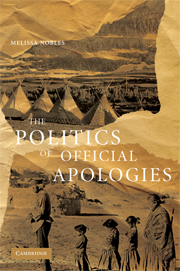Book contents
- Frontmatter
- Contents
- Preface and Acknowledgments
- 1 Toward a Membership Theory of Apologies
- 2 History of National Memberships in Australia, Canada, New Zealand, and the United States
- 3 To Apologize or Not to Apologize: National Histories and Official Apologies
- 4 Beyond Sentiment? Apologies and Their Effects
- 5 The Weight of History and the Value of Apologies
- Appendix: Twentieth- and Twenty-First-Century Public Apologies
- Bibliography
- Index
1 - Toward a Membership Theory of Apologies
Published online by Cambridge University Press: 24 May 2010
- Frontmatter
- Contents
- Preface and Acknowledgments
- 1 Toward a Membership Theory of Apologies
- 2 History of National Memberships in Australia, Canada, New Zealand, and the United States
- 3 To Apologize or Not to Apologize: National Histories and Official Apologies
- 4 Beyond Sentiment? Apologies and Their Effects
- 5 The Weight of History and the Value of Apologies
- Appendix: Twentieth- and Twenty-First-Century Public Apologies
- Bibliography
- Index
Summary
Governments are not in the habit of apologizing for their own injustices, let alone those perpetrated by former governments in distant and not-so-distant pasts. Yet they sometimes do, most often in response to the demands of organized citizen groups or former adversaries, but not always. In widely known instances, former belligerents have apologized for crimes committed during World War II. Similarly, in democratizing nations, former perpetrators of state crimes have apologized for their past actions. For both, the desired outcomes are clear, if not always achieved. Former belligerents may apologize, thereby easing relations between the two, as in the case of France and Germany. In contrast, Japan's repeated failures to apologize unambiguously for its war crimes have made reconciliation with neighboring countries difficult. For new democracies, proponents assert that apologies will advance societal reconciliation and strengthen democratic consolidation.
But neither the latest wave of democratization nor World War II crimes account for all present-day apologies or demands for them. Groups have demanded and governments have offered apologies for historical injustices. Australian Aboriginal peoples have urged Prime Minister John Howard to apologize for the state policy, begun in the early twentieth century, of removing “half-caste” Aboriginal children from their parents' care, usually forcibly. Aboriginal Canadians and New Zealand Maori continue to press for greater political and economic autonomy, after receiving official apologies from the Canadian government and the British Crown, respectively. African Americans call for apology and reparations for two hundred years of slavery.
- Type
- Chapter
- Information
- The Politics of Official Apologies , pp. 1 - 41Publisher: Cambridge University PressPrint publication year: 2008

